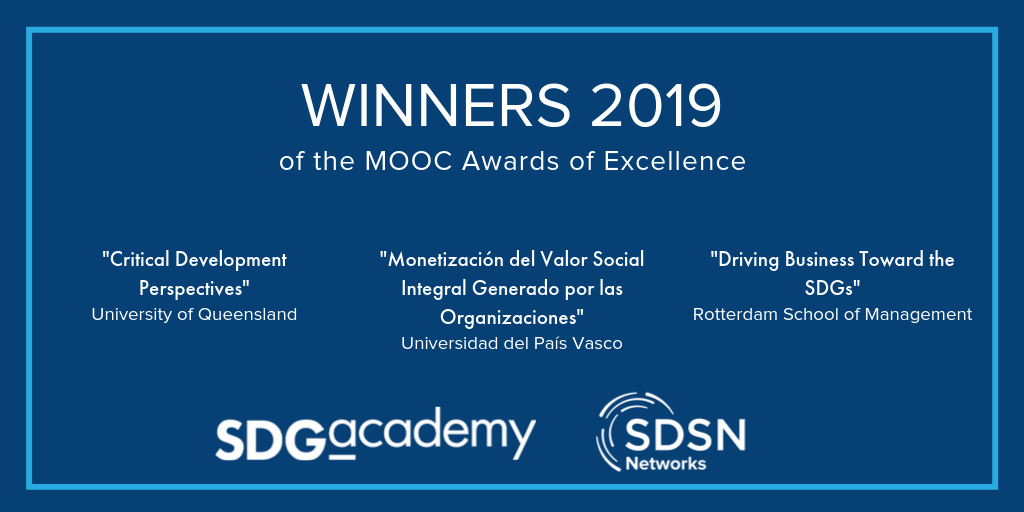The SDG Academy and the SDSN Networks Team are thrilled to announce the top three MOOCs! All three courses exemplified stellar commitment to the SDGs and building knowledge and capacity around SDG implementation. They are also artfully presented, highly engaging, and advance Agenda 2030 through the potential for large-scale learner engagement.
Driving Business Toward the SDGs, from the Rotterdam School of Management
About the course: What can businesses do to counter climate change and create a sustainable business culture? Why is this relevant for business anyway? Explore how business can contribute to a better future for people AND the planet without giving up profits. Extreme weather events, wars, famine and environmental destruction are just a few of the wicked problems faced by humanity. That’s why in 2015 the United Nations adopted the 2030 Agenda for Sustainable Development. This agenda includes 17 Sustainable Development Goals (SDGs) that target the big challenges such as how to eliminate poverty, how to protect the environment and how to bring about peace. Every member state committed to achieving these goals by 2030. This course has been developed by Rotterdam School of Management at Erasmus University (RSM). It focuses on the role of businesses in achieving the SDGs. You will gain insights from leaders of international companies and academics in business and management who will guide you through the issue of how businesses can contribute to the SDGs.
Critical Development Perspectives, from the University of Queensland
About the course: There is a vast array of different arguments about what development is and how development can be achieved. A leader in development must be able to understand, appreciate, evaluate and broker between differing and sometimes conflicting perspectives and ideas. In this course you will develop skills in critical thinking and analysis, while being introduced to some of the contemporary debates and current challenges facing development practice. The wide variety of topics covered will also give you a sense of the diversity of issues that development encapsulates. Learners are encouraged to reflect on their own ideas and practice, and share their perspectives with other learners and the course team. This course has been brought to you by the University of Queensland.
About the course: En este momento, existe una determinada preocupación de la sociedad en relación con el hecho de que las organizaciones generan valor social o, por el contrario, lo detraen. En este contexto, son muchas las organizaciones, tanto sociales como mercantiles, e incluso de la administración pública, que se están planteando cómo pueden identificar y trasladar a la sociedad el valor que generan a la misma. En la actualidad no existe un concepto unificado de contabilidad social y mucho menos una metodología unificada que permita la monetización de dicho valor de forma sistemática. El grupo de investigación ECRI (www.ehu.eus/ecri) que soporta la propuesta de MOOC, ha desarrollado un marco conceptual en relación con la contabilidad social (Modelo poliédrico) y un proceso metodológico de cálculo, denominado SPOLY que está encontrando amplia aceptación en la comunidad científica internacional, y entre potenciales organizaciones usuarias.
At the moment, there is a certain concern of society regarding the fact that organizations generate social value or, on the contrary, detract from it. In this context, many organizations, both social and commercial, and even public administration, are considering how they can identify and transfer to society the value they generate to society. At present there is no unified concept of social accounting, much less a unified methodology that allows the monetization of this value in a systematic way. The research group ECRI (www.ehu.eus / ecri), which supports the MOOC proposal, has developed a conceptual framework in relation to social accounting (polyhedral model) and a methodological calculation process, called SPOLY, which is finding wide acceptance in the international scientific community, and among potential user organizations.
A big thank you to all who participated in the contest, and congratulations to our winners!
